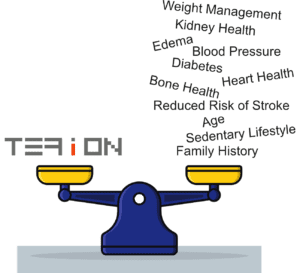Personal Care Product


Charged Drinking water
TERiON Drinking water as a dietary supplement is a Concept, which has more health benefits on its own than VLSSS. TERiON Anions equilibrium reacts in many more cellular functions that ensure, every user is healthier.
Anion-enriched water involves altering the mineral composition of water to potentially enhance its taste and provide specific health benefits associated with the included anions. Anions react with all cations within the body and “ion balancing” is occurring.

Pregnant women and Children
Pregnant Women
![]() Electrolyte Balance
Electrolyte Balance
Maintaining proper electrolyte balance is essential during pregnancy. Adequate levels of ions like sodium and potassium help regulate fluid balance, blood pressure, and nerve function in pregnant women.
![]() Muscle Function
Muscle Function
Ions like calcium and magnesium are essential for muscle function, including the muscles of the uterus. Adequate ion balance helps support uterine contractions during labor.
![]() Bone Health
Bone Health
Calcium is vital for maintaining strong bones and teeth in both the mother and the developing fetus. Proper ion balance contributes to healthy skeletal development.
![]() Nervous System
Nervous System
Ions play a role in nerve signaling and neurotransmitter release. Adequate ion balance supports the proper functioning of the nervous system, which is essential for mood regulation and overall well-being.


Children
![]() Growth and Development
Growth and Development
Proper ion balance is crucial for the growth and development of children. Calcium, for example, is essential for bone and teeth formation.
![]() Nerve Function
Nerve Function
Ions like sodium, potassium, and calcium are involved in nerve impulse transmission. This is critical for cognitive development, learning, and coordination in children.
![]() Muscle Function
Muscle Function
Adequate levels of ions support muscle function, allowing children to engage in physical activities and develop motor skills.
![]() Electrolyte Balance
Electrolyte Balance
Children have unique electrolyte needs due to their rapid growth and higher activity levels. Maintaining proper electrolyte balance supports hydration and overall health.
![]() Immune System
Immune System
Some ions, such as zinc and selenium, play a role in immune function. Proper ion balance contributes to a healthy immune system in children.
![]() Implications for Health
Implications for Health
Imbalances in ions during pregnancy and childhood can have various health implications:
In children, ion imbalances can impact growth, bone health, nerve function, and overall development.
![]() Prevention and Management
Prevention and Management
For pregnant women and children, a balanced and nutritious diet that includes a variety of foods rich in essential minerals is essential. Adequate hydration and regular medical check-ups can help monitor ion levels and ensure overall health. If you have concerns about ion balance or specific nutritional needs, it’s advisable to consult with a healthcare provider or registered dietarian who can provide personalized guidance based on individual health status and needs.
Applications

Washing meat, vegetables.

Soaking Processed meat & cut vegetables.

Steamed & cooked foods.

Personal Hygiene
